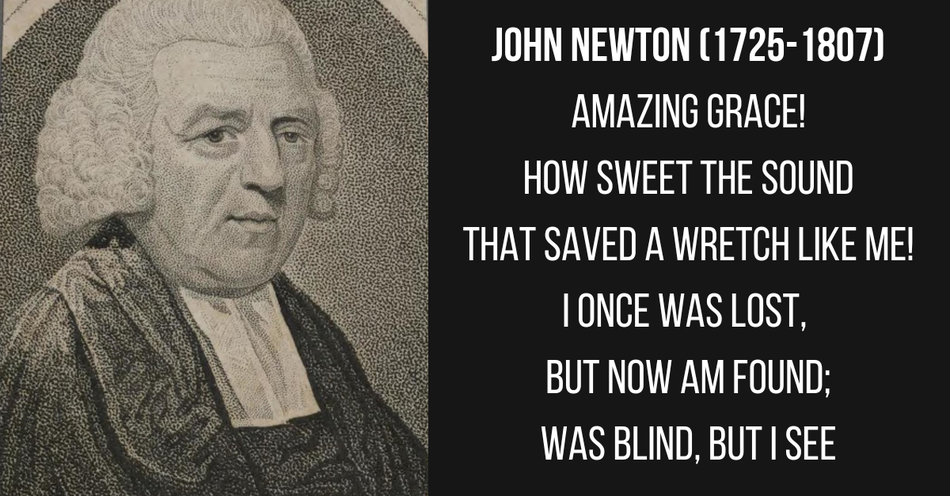Seafarer, slave trader, abolitionist, cleric, son, husband, and writer of letters and hymns. These are some of the ways to describe John Newton. Perhaps you have heard a sermon that mentioned him or read a book that revealed information about his life. Working on a slave ship at a young age and later becoming a slave himself influenced Newton’s attitudes and positions on slavery and religion. Years later, after finding faith and trusting God, he wrote one of the most famous hymns ever: “Amazing Grace.”
Who Was John Newton?
Although some people may best know John Newton as the author of “Amazing Grace,” he wrote other songs and many sermons. His letters and other writings show examples of his life journey. From a young boy to an elderly man, Newton grew in faith and maturity. From a youth filled with rebellion to a conversion experience, John Newton learned to trust in the Lord and not lean on himself.
10 Important Events in the Life of John Newton
1. On August 4, 1725, John Newton was born in Wapping, London. His parents were John Newton, Sr., and Elizabeth Newton. Even though Newton’s mother had shared Scripture with him, a conversion would not happen until later in his life.
2. Elizabeth died from tuberculosis when John was about seven years old. His father married again, and after a few years at a boarding school, John went to live with his father and stepmother.
3. A few years after his mother died, Newton began going on sea voyages with his father, a merchant navy captain.
4. In 1744, Newton was conscripted into the Royal Navy. He deserted and was caught and flogged. Historians describe him as living an arrogant, amoral life in the navy.
5. In 1745, Newton transferred to a slave ship and worked for a slave trader, Mr. Clow, on the African coast. Mr. Clow’s mistress mistreated Newton, and he was forced to beg for food and live as a slave for two years.
6. In 1748, after successfully leaving Mr. Clow’s employ, John Newton was aboard the Greyhound when a horrific storm hit. He remembered The Imitation of Christ by Thomas á Kempis and verses from Proverbs during the storm. Newton says he converted during that storm but did not become a full believer until later.
7. In 1750, Newton married his childhood sweetheart, Mary Catlett.
8. In 1772, Newton wrote the famous hymn, “Amazing Grace,” describing the joy of going from despair to salvation through the grace of God.
9. In 1787, Newton wrote “Thoughts Upon the African Slave Trade” in hopes of helping end slavery.
10. On December 21, 1807, John Newton at 82 years old. He was buried beside his wife, Mary.
Top 10 Inspiring Quotes by John Newton
1. “I hope it will always be a subject of humiliating reflection to me, that I was, once, an active instrument, in a business at which my heart now shudders.”—“Thoughts Upon the African Slave Trade”
2. “I thought, allowing the Scripture premises, there never was or could be a sinner as myself: and then comparing the advantages I had broken through, I concluded at first, that my sins were too great to be forgiven.”—Memories of the Rev. John Newton
3. “From this period I could no more make a mock of sin, or jest with holy things: I no more questioned the truth of Scripture, or lost a sense of the rebukes of conscience. Therefore I consider this as the beginning of my return to God, or rather His return to me: but I cannot consider myself to have been a believer in the full use of the word till a considerable time afterwards.”—Memories of the Rev. John Newton
4. “Though unwilling to give offence to a single person; in such a cause, I ought not to be afraid of offending many, by declaring the truth; if, indeed, there can be many, whom even interest can prevail upon to contradict the common sense of mankind, by pleading for a commerce, so iniquitous, so cruel, so oppressive, so destructive, as the African Slave Trade!” —“Thoughts Upon the African Slave Trade”
5. “Let us pray that we may always be ready, that our hearts may be withdrawn from worldly things, and be fixed, trusting in the Lord.”—Letters to a Wife
6. “Death itself can only part us for a little space, as the pier of a bridge divides the stream, for a few moments, but cannot make a real separation.”—Letters to a Wife
7. “The best relief against those discouragements we meet with from men, is to raise our thoughts to God and heaven.”—“The Small Success of Gospel-Ministry”
8. “When there is more knowledge in the head than experience in the heart, many and various are the evils that often ensue.”—The Works of the Rev. John Newton edited by the Rev. Richard Cecil, A.M.
9. “Sin is the sickness of the soul, in itself mortal and incurable, as to any power in heaven or earth but that of the Lord Jesus only.”—Letters by the Rev. John Newton (p. 69)
10. “They lead us to a consideration of past mercies and future hopes and intimate the frame of mind which becomes us when we contemplate what the Lord has done for us.”— “Amazing Grace: The Sermon Notes”
10 Things You Need to Know about John Newton
1. John Newton was rebellious as a rebellious boy and young sailor. His mindset changed after his conversion, and he hoped to “promote the life of God in the soul” to his crew and others.
2. Newton marked March 10, 1748, as an anniversary of his conversion. After that, he avoided profanity, gambling, and drinking.
3. Newton eventually became disgusted with the slave trade, quit his job, and began holding Bible studies in his home. He was ordained in the Anglican ministry in 1764 and led a parish in Olney.
4. He taught himself Latin and geometry.
5. In 1785, Newton helped William Wilberforce found the Society for Effecting the Abolition of the Slave Trade or the Anti-Slavery Society.
6. After Newton wrote “Thoughts Upon the African Slave Trade,” every member of Parliament was sent a copy.
7. Newton is quoted as saying, “I cannot consider myself to have been a believer in the full sense of the word, until a considerable time afterward.” His conversion began during the storm on the ship. He prayed to God for safety and remembered the Scripture his mother had taught him.
8. Newton co-wrote hymns with poet William Cowper, including “Amazing Grace.”
9. During his last years, John Newton had a stroke and became blind and feeble.
10. Newton died nine months after Parliament abolished the slave trade in the British Empire.
What Can We Learn from John Newton
Even though Newton’s mother had shared Scripture with him, a conversion would not happen until later in his life. The beginning of his trust and faith in God began while he endured the mighty storm on the Greyhound. He cried out to God for mercy, and the storm weakened.
When we cry out to God during a crisis, we can find comfort in knowing He is listening.
In His Name,
Melissa Henderson
Further Reading:
John Newton Converted by Amazing Grace
The Love of John and Mary Newton
John Newton Discovered Amazing Grace
Photo Credit: Graphic by Gabriel Connor Salter. Public domain photo, circa 1788, via Wikimedia Commons & National Library of Wales.

Melissa is the author of Licky the Lizard and Grumpy the Gator. Her passions are helping in the community and church. Melissa is an Elder, Deacon, and Stephen Minister.
Follow Melissa on Facebook, Twitter, Pinterest, and at https://www.melissaghenderson.
This article is part of our People of Christianity catalog that features the stories, meaning, and significance of well-known people from the Bible and history. Here are some of the most popular articles for knowing important figures in Christianity:
How Did the Apostle Paul Die?
Who are the Nicolaitans in Revelation?
Who Was Deborah in the Bible?
Who Was Moses in the Bible?
King Solomon's Story in the Bible
Who Was Lot's Wife in the Bible?
Who Was Jezebel in the Bible?
Who Was the Prodigal Son?





